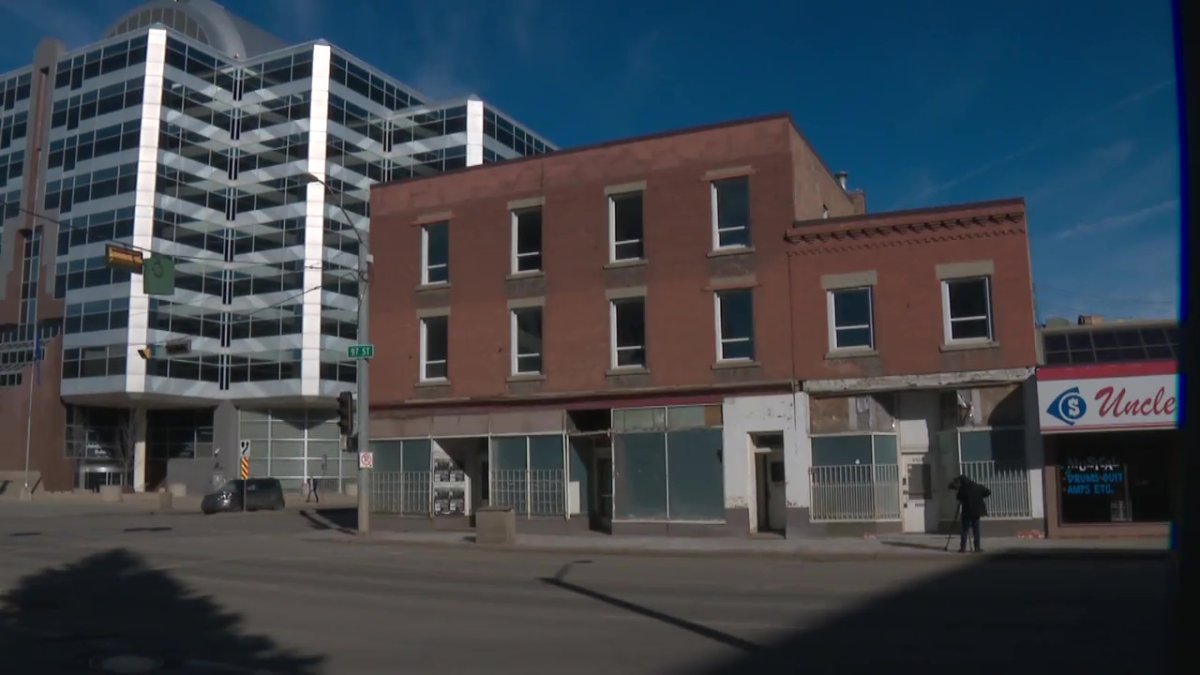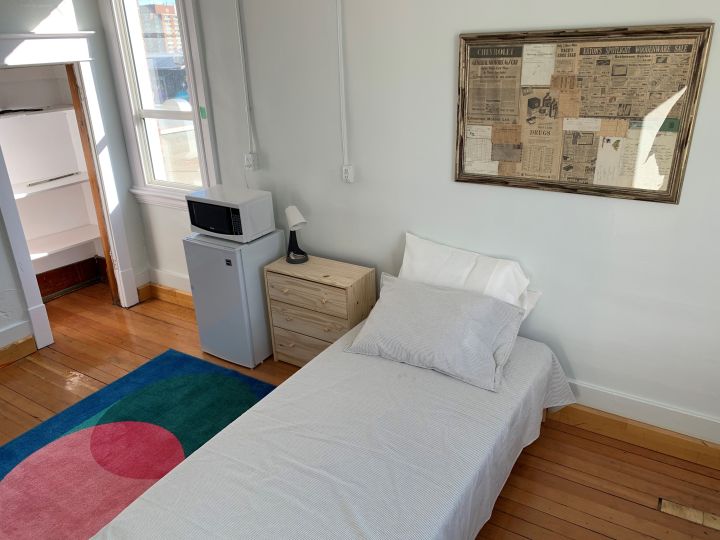A heritage building in downtown Edmonton is primed for a second chance to shine while simultaneously offering a new lease on life to people who identify as women and are struggling with poverty or homelessness.

An Edmonton father and son who are also partners at a local real estate firm announced details of their plan for the historic Stovel Block after purchasing the building. The building, which is located on 97 Street, is situated across from the Royal Alberta Museum.
“We tend to take on buildings where we think we can make a difference in the immediate area, but also the broader sense of downtown,” Kelly Pope, a partner at Gather Co., said at a news conference on Tuesday.
“Affordable housing… we’re in great need of that.”
Pope had long admired the Stovel Block building and when the opportunity to purchase the structure came about, Gather Co. jumped at the opportunity and then later came up with the idea of trying to help address the city’s homelessness crisis.
“We naturally love historic buildings,” said Devin Pope, who is also a partner at Gather Co. “My father loved this building and it was a dream of his to buy it. We purchased it not really knowing what to do.
“We really decided to do something good for Edmonton and give back.”
Devin said his team lives, works and spends time downtown and wanted to help benefit the community. They began discussions with Boyle Street Community Services, a local charity that works with poverty-stricken Edmontonians, about how to best use the space.
Devin said Gather Co. was informed there was an immediate need for transitional housing for women in particular.
“Boyle Street brought up it was an important need and there’s a real demand for it but not a lot of options,” he said.
“(We want to) give folks that are on the street a break,” Kelly said. “Hopefully some of them can move on to another phase of their life.
“If we can make a difference with one person, it’s all worth it to me.”
An official with Boyle Street Community Services said it will lease the second and third floors of the three-storey building and finance the initiative through fundraising and without any government funding to help house up to 30 people who identify as women.
Jordan Reiniger, the executive director of Boyle Street Community Services, said a selection process has yet to be established, but the idea of the space is to offer flexibility to “street-involved” women in terms of how long they need to stay in the building.
“Whatever the woman needs when they come, if that’s three weeks or two years, we want to be able to create that space for them here,” he said, adding Boyle Street’s goal is to help women get back on their feet so they can find more permanent housing once they’re ready.
Reiniger said while the city is “in the midst of a housing crisis” in general, women face unique risks in terms of trying to survive on the street.

Get daily National news
READ MORE: A study says Canada’s homeless women are ‘invisible.’ COVID-19 could make it worse
Beth Muller, housing manager at Boyle Street Community Services, said she is aware of approximately 2,000 people living without a home in Edmonton. She said the Stovel Block will be part of a transition for women but that there is a “long-term goal of finding more permanent housing beyond here.”
“We’ve been talking about this a lot of late, the shelter model we have is not working,” Reiniger said.
Coun. Scott McKeen also spoke at Tuesday’s news conference and agreed that it’s time to move on from the shelter model for addressing homelessness.
“It’s dehumanizing… demeaning,” McKeen said of the reality that homeless people often need to line up in the cold to get into a crowded shelter with less than ideal sleeping conditions before being required to leave the next morning.
He added that he believes putting so many desperate people together in one space can be demoralizing and even unsafe and may not be helpful for people trying to escape the cycle of poverty.
“That’s not healing,” McKeen said. “In fact it might be harming.”
- Quebec premier calls on Bloc Québécois to help topple Trudeau government
- Americans can now renew passports online. Canadians are still waiting
- Pablo Rodriguez quits Trudeau cabinet to seek Quebec Liberal leadership
- Telus call centre workers in Ontario facing ‘extreme stress’ as they fight Quebec move
How the transitional housing spaces at Stovel Block will work
The housing units at Stovel Block are meant to help provide a safe space to help house women but they won’t be living rent-free.
“The expectation is that they (residents) are paying monthly rent,” Muller said, adding that a live-in resident manager and other support staff will help connect new residents with sources of income.
She said the expectation that residents pay rent is geared towards helping the women acquire skills and habits that will help them be successful in finding and keeping permanent housing once they leave the Stovel Block.
Reiniger said IKEA is donating furniture for the housing units. He said the private and semi-private living spaces for homeless Edmontonians will be much more conducive to “helping people move forward in their life” than placing them in shelters with hundreds of others.
“We’re really excited about this home and what it will mean,” he said, adding that an Indigenous elder has given the transitional housing space the name Sakhita Kikinaw, which roughly translates to “place of love.”
“As you walk through this building, it’s such a bright, beautiful space,” Reiniger said. “It’s going to be a wonderful home.”
Kelly Pope said the main floor will be occupied by a bookstore which will be donating books to the transitional housing upstairs. He added that the main floor is being renovated in keeping with the historical nature of the building.
An Edmonton business ‘stepped up to do their part’
McKeen said while he feels the current city council has taken great strides on addressing homelessness, overall, “government has failed on this issue” for many years.
“(Gather Co.) are today busting some old myths about the private sector in Edmonton,” he said. “The Popes have done this all on their own and they deserve a ton of credit… the Popes are not a multi-billion-dollar corporation.
“They have a good heart and they’re clearly interested in building Edmonton as a great city.”
McKeen added that he believes governments can do a better job of trying to collaborate with the private sector on addressing what he called the city’s supportive housing deficit.
READ MORE: 80 supportive housing units to be built in 2 Edmonton neighbourhoods by end of 2021
He noted that by 2022, the city will have five supportive housing facilities “on the books,” crediting Mayor Don Iveson’s leadership and the support of the federal government for that development. He noted that he still hopes the provincial government will “step up the way they need to step up.”
“People die on the street regularly. It’s a tragic, desperate, horrible lifestyle,” the Ward 6 councillor said. “The other sad truth is it costs way more money, way more tax dollars… (if you leave) people on the street… than supportive housing.”
He linked the cost of emergency medical care and costs associated with the justice system with the problem of homelessness. He also said he remembers one year in which the city spent over $1 million simply on tearing down homeless camps.
“Coming out of the pandemic, there’s going to be a lot of desperation,” McKeen said, adding he believes the problem of poverty in Edmonton is poised to potentially become greater than ever before once the COVID-19 crisis recedes.
READ MORE: Alberta budget: Edmonton mayor ‘confounded and disappointed’ with province on supportive housing
McKeen said private entities like Gather Co. can move swiftly to bring initiatives like the one at Stovel Block into reality as opposed to the city, which often runs into delays because of what he called red tape.
“I’m deeply moved by the fact that a small business in Edmonton… stepped up to do their part,” he said. “I hope people get that… I know we’re going to see more of it.
“Imagine a city where there’s no homelessness, where addiction is treated with health care options (and) not with incarceration, imagine plummeting crime rates because of that, safer communities, cleaner streets… I want to live in that city.”
Watch below: Some Global News videos about housing in Edmonton.
The Popes said the Stovel Block is an “Edwardian-era commercial building” that was designated as a municipal heritage resource in 2019.















Comments